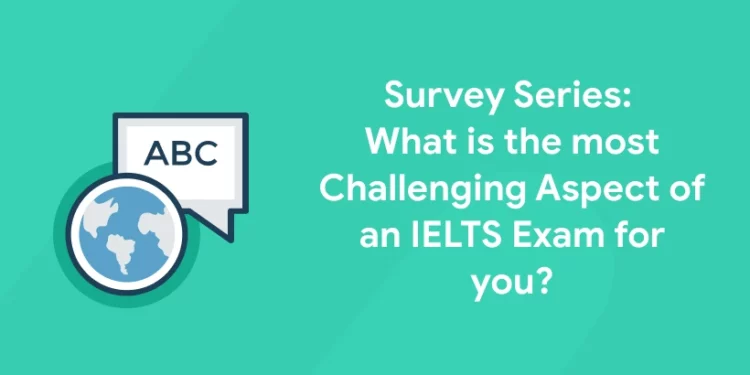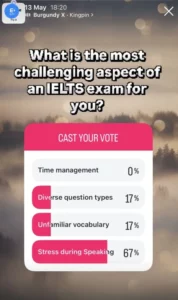Table of Contents
Have you ever run a marathon?? All of us can agree on the fact that it is not easy and requires stamina, focus, and the right strategy. The IELTS exam is no different, since it is also a marathon to get the highest or the desired band score. This blog is based on a survey that asked the aspirants what was the most challenging aspect for them in the IELTS exam. Read on to know what the community said.
Check out this video by Entri in Malayalam!
Introduction: Survey Overview
Our team at Entri debated for a long period on what is the most challenging aspect of the IELTS exam. Since we were not getting anywhere, we decided to roll out a survey on Instagram for our IELTS community. After all, those who are preparing and those attempted the exam would be the worthy ones to answer the question. Here is the survey that we rolled out:
- What is the most challenging aspect of an IELTS exam for you?
- Time management
- Diverse question types
- Unfamiliar vocabulary
- Stress during Speaking
The survey was met with a lot of engagement and some interesting results. Within 24 hours of the survey we got participation from almost all of our followers which is a big feat in understanding the challenging aspect of the IELTS exam. Now, let us take a look at the snapshots of the result.
Want to get a 8 band score in IELTS? Enrol now with Entri!
Analysis: What the Aspirants Struggle with the Most
1: Most university students ........................ on campus in their first year.
Based on the survey results we’ll now analyse each challenge and their complexity. Additionally we’ll also be providing tips on how to approach each challenges, so that you can score the desired band.
⏳Time Management
Time management is a major factor for any exam throughout the globe. Surprisingly, this option was not selected by anyone in this survey! This suggests that the time constraints might be a thing of the past for the IELTS exam. However, this may not be the same for everyone as it all depends on the type of questions you receive during the exam. Some may be easy, while some may require you to take some extra time. Here is a quick overview of how the exam duration works, by a fellow aspirant:
In Reading, you get 60 minutes to answer 40 questions across three lengthy passages. In Writing, two tasks must be completed in one hour—one of which is an essay. Even Listening and Speaking demand quick thinking and rapid responses.
Tips to Improve:
- Try the ‘skim and scan’ technique especially for the Reading section. Practice and learn to identify the major and relevant points through skimming.
- Restrict yourself to 20 minutes for Task 1 of Writing section. This enables you to formulate sentences faster in your head, while writing it down, simultaneously.
- Simulate a real test environment, especially, by timing yourself. Practice such sessions regularly to get the maximum benefit.
- Use pointers while noting down in the Listening section to make sure you are up to speed.
🔀Diverse Question Types
Knowing everything alone won’t just be enough to appear in the IELTS exam. Adaptability is what you need due to the various types of questions you may encounter. For instance, the Writing section may require you to interpret graphs, maps, or processes. Similarly, the Reading section may involve true/false/not given questions, paragraph matching, or sentence completion.
Imagine you are doing well in the Listening section, and suddenly a question about maps come up, and before you realise it, you are frantically mixing up left and right directions. These instances require you to be able to adapt to various types of question types, regardless of encountering it even for the first time. The survey shows that 17% aspirants consider diverse question types as the most challenging aspect of an IELTS exam. This shows that being unaware of diverse questions can put you in a spot during the exam.
Tips to tackle:
- Try venturing into new formats instead of practicing what you are good at.
- Make sure to familiarise yourself with all question types by leveraging official IELTS materials and mocks tests.
- Invent a ‘strategy list’ for each type of question, so that you don’t waste time on deciding where to begin.
Struggling with Speaking? Enrol now to study with our expert IELTS mentors!
📚Unfamiliar Vocabulary
Do you know what’s the silent threat in the IELTS exam? It is the unfamiliar vocabulary that appears out of nowhere. Within a general outlook, it may seem harmless, but what we tend to overlook is the fact that these words can change meanings easily. And, that’s where the scores get pinched and why 17% people say that it is the most challenging aspect for them in an IELTS exam.
For instance, while reading a passage about climate change in the Reading section, most of the people assume the word ‘precipitation’ to mean ‘evaporate’. This leads to a wrong answer if the questions are directed towards this part of the passage.

Tips to Build Vocabulary:
- Make sure you understand the context of each new word and how they function in sentences instead of just memorising them.
- The easiest way is to read on a daily basis. Select quality newspapers like The Hindu, and other academic blogs that actually help you. (Listening to Shashi Tharoor might also do the work!😉)
- Develop a habit of recording new words with their example sentences in a notebook.
🎤Stress During Speaking
67% of the community members voted stress during speaking as the most challenging aspect while appearing for the IELTS exam, making it the most voted. This is justified as the Speaking section is the most personal and spontaneous part of the whole IELTS exam. The pressure is real when you are seated across the invigilator, face-to-face, while talking about topics which you may or may not have thought of before. And to top it off, you are being judged for your fluency, pronunciation, and coherence.
Formulating sentences on topics that you have never heard, may result in a panic over grammar, sentence structure, etc. The survey in itself shows that IELTS aspirants struggle the most during the Speaking section. A majority of the blame goes to the lack of English interaction among peers in India. However, it is never too late to work on your interaction and turn it into a piece of cake!
Tips to Reduce Speaking Anxiety:
- Make use of relaxation techniques such as deep breathing, mindfulness, and visualization to calm down the pre-test blues.
- Develop a habit of simulating test environments with a friend, tutor, or a fellow aspirant, regularly.
- Record your own speech and identify repetitions and issues in fluency. Remember, you are your only competitor!
Thinking about levelling up your vocabulary game? Enrol now at Entri’s IELTS course!
Ace Your IELTS Exam with Confidence!
Unlock your potential with our expert-led IELTS preparation course. Achieve your dream score and open doors to global opportunities!
Start Your IELTS Journey Today!Final Thoughts: Make Yourself Aware
Each person has their own strengths and weaknesses. The major difference that you can bring about is to be aware of your shortcomings and work on them. The same should be applied on IELTS preparation as well. The survey tells us that many people struggle on how to take the test. Thus, a requirement for converting your weaknesses into your strengths is necessary for success.
Whether you are racing against the clock, navigating question types, taming unfamiliar vocabulary, or battling exam stress, remember that these are skills that you can actually develop and master. The first step is to know what you have to focus on and combining that with a hunger for conquering, you can easily pass with flying colours. You can check out Entri’s IELTS course that can help you identify your weaknesses and turn them into strengths with one-on-one mentorship and live classes. Enrol now to ace the IELTS exam!
What about you?
Do you want to say what is the most challenging aspect of an IELTS exam? We would love to hear that! DM us on our Instagram page and we would love to share tips.
Until then, happy studying! 📖✨
Ace Your IELTS Exam with Confidence!
Unlock your potential with our expert-led IELTS preparation course. Achieve your dream score and open doors to global opportunities!
Start Your IELTS Journey Today!Frequently Asked Questions
Why is time management such a big issue in the IELTS test?
Time pressure is a constant across all sections of IELTS. Each part has strict time limits, and tasks are designed to challenge your pacing and prioritization. For example, the Reading section has 40 questions to answer in just 60 minutes, often based on lengthy and complex passages.
How can I improve my time management for IELTS?
Some practical tips include:
-
Practicing with a timer to simulate real test conditions.
-
Allocating specific time blocks for each section (e.g., 20 minutes per Reading passage).
-
Writing outlines before jumping into essays to stay on track.
What do you mean by ‘diverse question types’ in IELTS?
The IELTS exam includes a variety of question formats to test your comprehension, critical thinking, and communication. These include:
-
Multiple-choice
-
Matching headings
-
Sentence completion
-
Diagram labeling
-
Short answer
Being unfamiliar with these formats can slow you down or cause confusion.
How can I get better at handling IELTS question variety?
Familiarity and repetition are key. Practice with official IELTS materials or reputable prep books. Focus especially on the question types that you personally find confusing, and learn test-specific strategies for each.
How can I reduce stress before the IELTS Speaking test?
Try the following:
-
Practice regularly with a partner or tutor.
-
Record yourself answering cue card questions and analyze your performance.
-
Learn relaxation techniques like deep breathing or visualization to calm nerves before the test.
What’s a good way to find my personal weak areas in IELTS?
Take a full-length mock test under timed conditions. Afterward, analyze your performance:
-
Where did you run out of time?
-
Which questions felt confusing?
-
Which section caused the most anxiety?
Your answers will help you focus your preparation more effectively.














